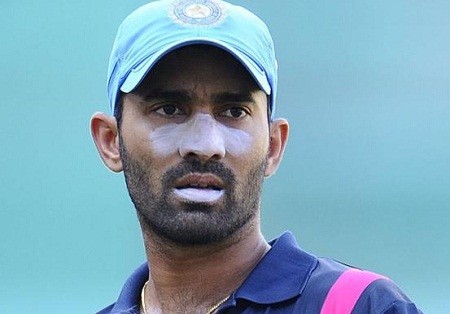
If the sight of Vijay Shankar entering the nets as the first batsman gave rise to thoughts that he will be the man to bat in the middle-order slot to be vacated by KL Rahul, they did not last long. After about half an hour during which Vijay took throwdowns, in came Dinesh Karthik. Batting in the net adjacent to the one used by Virat Kohli, he too batted for a good 30 minutes or so.
It was not just the onlookers who were unsure of which of the two would make it to the XI for Thursday’s match against New Zealand. The Indian team too seemed to be facing a dilemma on this front. The factor of experience might have titled the balance in favour of Karthik, but chief coach Ravi Shastri keeping a close watch on Vijay suggested it was 50:50 between the two Tamil Nadu players.
With Shikhar Dhawan out and Rahul set to open, the team management has to make a fresh adjustment in the middle-order which for some reason or the other remains an area of constant flux.
“There are various options the team management can utilise going into the next game. Obviously, Vijay Shankar is going to be an option and there are a couple of others as well,” India’s assistant coach Sanjay Bangar did not give away much at the pre-match media interaction session.
Broadly, this complicates things for India on two counts. First, the trusted opening pair has to be broken. Dhawan and Rohit Sharma have formed one of the most productive combinations at the top of the order in international cricket since coming together in 2013.
Their performance has shielded weaknesses lower down. Second, irrespective of whether it’s Vijay or Karthik, the player coming in will be someone without much of match practice.
Bangar, as his role in the squad demands, has to look at the brighter sides.
“The advantage of playing in various situations is that you understand your game a lot better. If you're batting in the middle-order and you're a top-order batsman, you get to know the challenges faced by the middle-order.
"It's a mental adjustment. Any player who is able to do that requires a lot of skill. Because of Dhawan’s injury we have to make changes, but we’re happy with the back-up options.”
Off to a strong start with two fairly convincing victories, the Indian team is suddenly confronted by an unexpected challenge. If the rain relents and the match takes place, expect Trent Bridge to be different from the venue which saw the world record ODI total of 481/6 last year.
The ball will do a bit and in Trent Boult, Lockie Fergusson and Matt Henry, New Zealand have the resources to take advantage of such conditions.
India’s batting approach in the first two games did suggest that batsmen are ready to respect the conditions.
On Thursday this part of their game will be tested. Forced to make changes in their trusted combination, they need to show that their Plan B is as effective. It will be a big boost if it comes off, but failure will lead to a new set of questions.
“In England, you know you're bound to get a few days when the weather will be difficult. Let's keep fingers crossed,” said Bangar has ruled out.
There is a provision of playing on the next day in case a match doesn’t happen, but that is only for the two semifinals and the final. For the 45 matches in the league days, it’s either a truncated match or a no match if it rains.
“Factoring in a reserve day for every match would significantly increase the length of the tournament and practically would be extremely complex to deliver.
It would impact pitch preparation, team recovery and travel days, accommodation and venue availability, tournament staffing, volunteer and match officials availability, broadcast logistics and very importantly the spectators who in some instances have travelled hours to be at the game. There is also no guarantee that the reserve day would be free from rain either,” ICC Chief Executive David Richardson said in a statement.
It was exactly the opposite last summer when in a rare occurrence in England people were complaining of a heat wave. According to the statement by Richardson, there was just 2mm of rain last June.
“But the last 24 hours alone has seen around 100mm rainfall in the south-east of England. In the last couple of days we have experienced more than twice the average monthly rainfall for June which is usually the third driest month in the UK.”
The Indian team did have nets at the Trent Bridge on Wednesday, but the bowlers were not seen bowling because of slippery underfoot conditions, as batsmen took throwdowns.
The main pitch remained covered for most of the time in the morning. Soon after they left, a thin film of mist descended on the ground. On the roads, the umbrellas were back.


.jpeg)

